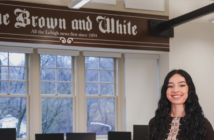In the fall of 2012, I was a wide-eyed sophomore who had high hopes for the new school year. I was optimistic about my future, determined to ace my classes and somehow convinced that I would go to the gym every day. I felt like I had more influence than I’d had the year before: I now had friends with cars, I knew without a doubt where all my classes were and I was able to advise freshmen on which courses to take.
On an even larger scale, my 19-year-old-self had the ability to vote in a presidential election for the first time — to me, that was the epitome of influence.
At the time, Barack Obama was running for reelection against Mitt Romney. With the echoes of my mother’s childhood lectures on the importance of voting in my ears, I filled out my absentee ballot, checked off a box and left the mail center with a sense of satisfaction, optimism and power.
Later on that day, my friends and I gathered to revel in our newfound influence in our country. We each excitedly shared our hopes for the outcome.
“I didn’t vote,” interjected my friend from across the room. We all kind of just looked at him, studying his face that seemed to be nonchalant, yet aware of our judgments all at the same time. I silently elected myself to be the one to ask him why. We were both from New Jersey, so I immediately disallowed him to use the absentee ballot as an excuse.
“There’s no point,” he said. “New Jersey always goes blue.”
Everyone continued to argue over this statement for the next hour. Some told him he was being ignorant; others weren’t really bothered by his statement. Another friend agreed with him and said that’s why he should have registered to vote in Pennsylvania— because it is a swing state. However, he stuck with his assertion that his one vote wouldn’t really make a difference in the election.
At the time, I was enraged by his comment. If everyone thought like he did, no one would vote, and our voices would never be heard. Even if one vote wouldn’t turn an election, it showed that we have some sort of say in who was being elected.
However, I was forced to reevaluate my rage in recent months after reading a study conducted by two professors from Princeton and Northwestern Universities. The study, “Testing Theories of American Politics: Elites, Interest Groups, and Average Citizens,” found that the United States government operates more like an oligarchy than a democracy.
Yes, you heard me correctly. An oligarchy — the same thing you learned about in middle school when studying the ancient Greeks and Romans. The Oxford English Dictionary defines an oligarchy as “a form of government in which the exercise of power is restricted to a few people or families.”
If you think about who these few people could be, it becomes clear just by looking at one of those posters with the faces of each president on it — that they are mostly white men. However, what the same poster won’t visually reveal is that our government (including presidents, senators and governors) is mostly made up of the wealthy.
According to a New York Times article about the money spent during the 2012 presidential election, each candidate spent well into the millions. Obama’s campaign raised $1072.6 million and spent $985.7 million, while Romney’s campaign raised $992.5 million and spent $992 million.
Of course, the Democratic and Republican parties, along with other donors, help raise a big portion of this money. However, the article goes on to reveal that each candidate raised a significant portion of the total cost on their own — Obama raised $775.4 million, and Romney raised $460.2 million.
In that election’s case, the candidate who spent and raised the most ended up winning. In fact, a 2014 Washington Post article found that the higher funded candidate won the election 91 percent of the time.
Just based on this information, it becomes clear that elections themselves are restricted to those who can afford it. In theory, anyone can run. But that is not the reality.
“Multivariate analysis indicates that economic elites and organized groups representing business interests have substantial independent impacts on U.S. government policy,” the Princeton and Northwestern study stated, “while average citizens and mass-based interest groups have little or no independent influence.”
This study, along with the high prices of running a campaign, have made the ballot box home to an elite group — dynasties, if you will. Dynasties of rich families.
Hilary Clinton has already announced her run for president. If she wins, she will be the second Clinton in the Oval Office. Jeb Bush is predicted to also make a run for the presidency. If he does and wins, he will be the third Bush in the Oval Office.
If you consider families who have had several members elected to the Senate, House of Representatives, or just government official spots in general, that list will grow — think the Kennedys, the Roosevelts and the Rockefellers, just to name a few.
“When the preferences of economic elites and the stands of organized interest groups are controlled for,” the study stated, “the preferences of the average American appear to have only a minuscule, near-zero, statistically non-significant impact on public policy.”
So, maybe New Jersey does always go blue, like my friend said. But maybe the more important question isn’t how much our vote counts for in terms of who will win. It’s how much our vote counts for if running for office is already restricted to the elite.






Comment policy
Comments posted to The Brown and White website are reviewed by a moderator before being approved. Incendiary speech or harassing language, including comments targeted at individuals, may be deemed unacceptable and not published. Spam and other soliciting will also be declined.
The Brown and White also reserves the right to not publish entirely anonymous comments.